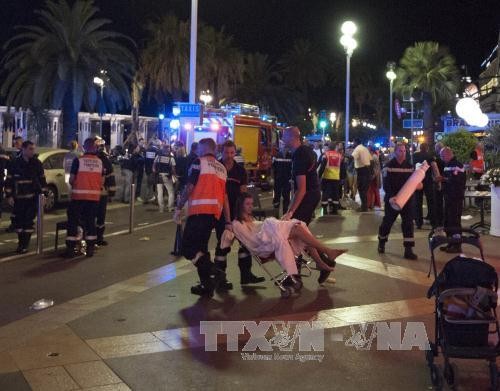(VOVworld) – Less than a year after the November 2015 terror attacks that killed 130 people, the world has been shocked by another attack – this time an intentional vehicle attack on a crowd of people watching fireworks on France’s National Day July 14.
 |
| Transporting the injured from attack site on July 14 (Photo: EPA/VNA) |
In the truck which moved down on a crowd celebrating National Day in the city of Nice and killed at least 80 people, police found the identity papers of a French-Tunisian citizen. The attack occurred just a few hours after Paris said it would not extend the state of emergency which was declared after the November 2015 terrorist attacks.
New security measures
Nice is now under its highest level of alert and troops have been deployed. In a televised speech, President Francois Hollande called the attack in Nice an obvious act of terrorism. He said France is under threat by Muslim terrorism and pledged to maintain 10,000 troops in the army’s anti-terror fight rather than reducing the force to 7,000 as previously announced. Mr. Hollande also said the state of emergency will be extended 3 more months. Although IS has not yet claimed responsibility for the latest attack, the French President warned of increased operations against IS in Iraq and Syria.
Right after the November 2015 attacks, Mr. Hollande vowed no mercy for IS. The Constitution has been amended to prolong the national state of emergency by 3 months instead of 12 days, and allow the revocation of French citizenship for dual nationality citizens who are found guilty of terrorism. President Hollande has promised to increase the budget for security and military forces. Hundreds of hunt-downs and raids have been conducted to nullify anyone who intends to attack France. Paris has intensified attacks in Syria, where terrorists planed the November 13th shooting sprees and suicide bombings in Paris and its outskirts. Mr. Hollande called on European countries to work closely with France to stamp out terrorist threats.
Profound reasons
Why has France and not another European country been the target of past attacks? Analysts attributed it to Paris’s prominent role in dealing with hot spots in North Africa, a region with a large Muslim population. Since 2014, France has been actively involved in the international alliance against IS and was one of the first countries to conduct airstrikes against IS.
On the other hand, the attacks on France will produce ripple effects. The way civilian targets were attacked was beyond what French security forces had anticipated. Furthermore, France is home to a large population of Muslims, mostly in the suburban areas. Economic troubles have made Muslim youths, who already have difficult life, more easily incited to extreme acts.
The terror attacks reveal weakness in the forecasting capability of French security forces. That’s why the Investigation Committee of France’s parliament has proposed a merging of intelligence services. Also Europe’s immigration and free travel policies have undercut domestic security efforts.
Until the root causes of terrorism are eliminated, France and other countries can expect recurrence of these deadly attacks.